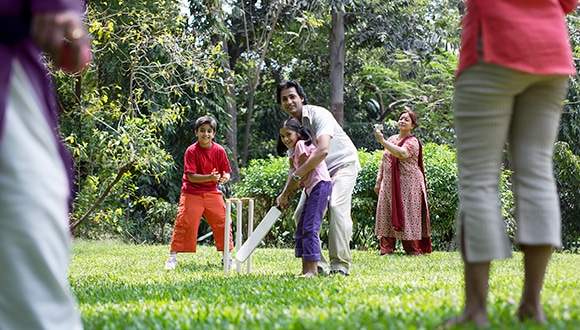Self-care tips and sleep habits to avoid Christmas stress
Published December 2023 | 6 min read
Expert contributor PSYCH2U psychologist Jeremy Cowden
Words by Karen Burge
Self-care tips and healthy sleep habits can help you find balance, calm and enjoy one of the busiest times of the year.
The festive season can be a whirlwind of activity. There are presents to buy, events to attend and end-of-year work deadlines as well as school concerts and a long school break for families just around the corner.
It's no wonder the mental load can feel so heavy when December rolls around. The good news is there are several strategies to help reduce stress and keep a lid on high emotions.
What is self-care?
The Australian Self-Care Alliance (a collaboration between healthcare consumers, health promotion charity, policy experts and industry partners, including HCF) sees self-care as being multi-layered. Not only is it about the food we eat or the activities we do, it's also about having the knowledge to know about health risks and actively practising ways to manage your health.
Setting aside time for self-care
A little self-care can go a long way in helping you find balance during the busy season. Whether it's reading a book, taking a walk or practising mindful meditation, a 10-minute time-out can have a positive impact on wellbeing.
To make it happen, PSYCH2U psychologist Jeremy Cowden recommends scheduling me-time into your phone calendar – even an appointment with the couch watching your favourite TV series.
For something more structured, Beyond Blue says just five minutes of mindful practice a day can have benefits to your mental health, which may assist in reducing stress, improving sleep and helping you manage emotions.
To support members with faster, easier access to qualified mental health professionals, we're offering a free telehealth HealthyMinds Check-in with a PSYCH2U psychologist for eligible members*, including tailored support for those aged 12 to 17.
Learn how to say no
Are you putting energy into activities that matter? It's important to set boundaries and manage your energy, says Jeremy, and this includes being able to say 'no'. Whether it's coffee with a friend, a dinner party or volunteering at school, it's okay to let someone know you're too exhausted or you have too much on right now.
Manage expectations
If you're hosting an event or you're responsible for buying family presents, you might feel added pressure.
"Managing your expectations is important and recognising that we don't have to do all of the things we might think. We're not going to be perfect and that’s okay, so starting with that idea is helpful," Jeremy says.
If you’re worried about certain relatives or a past experience at get-togethers, Health Direct recommends you side-step tensions by:
- avoiding topics that family members tend to argue about
- putting aside adult conflicts to focus on children's enjoyment
- breaking up family celebrations into smaller groups
- planning activities, like backyard cricket, as a distraction.

Take breaks from devices
It's easy to lose track of time while staring at devices. At this time of year there are plenty of brands and businesses trying to get your attention and a constant flow of social media posts showing festive fun.
Jeremy recommends setting device limits to stay in control. For example, give yourself 30 minutes to catch up on news, socials and fun, then put your phone aside and focus on what’s around you again. It's also worth recognising the falsehood of what you’re seeing on social media, particularly at this time of year, he says.
Enjoy festive food in moderation
Don't stress about not eating a perfectly balanced healthy diet – you can go back to a healthy routine after the festive season. But try to avoid highly processed foods where possible, consider healthy food and alcohol swaps and keep your body fuelled with healthy foods, like fresh fruit and vegies and protein.
"It's about finding balance between allowing ourselves a little fun and not beating ourselves up when it goes wrong," says Jeremy. "So have fun but also be mindful of slowing down and taking time to actually enjoy the food."
Drinking water is a useful way to space out food and alcohol, and if you're cutting back on alcohol, holding a glass of water might help deflect attention from those serving drinks, Jeremy suggests.
If you find you're drinking more to get through tough times, Daybreak^, Hello Sunday Morning’s online behaviour change program, can help you take the first step to changing your relationship with alcohol for the better.
It's an app that provides 24/7 digital support and connects you anonymously with a like-minded online community trying to change their relationship with alcohol.
Exercise regularly
Exercise is the ultimate mood-lifter and self-care activity. If you find yourself busy over the weeks leading up to Christmas, and you can’t seem to fit in your normal routine, Jeremy recommends breaking exercise into smaller bouts and including incidental exercise along the way.
"It all adds up and, physiologically in terms of your mental health, it [breaking exercise into shorter sessions] is actually as good if not better than an hour of solid exercise," says Jeremy.
Practise gratitude
If you're lucky enough to enjoy festive gifts and the company of loved ones, try to be in the moment and appreciate the good things in your life.
Jeremy says practising gratitude is an effective way to manage stress and it's as simple as making observations.
"We need to train ourselves to pause and acknowledge when good things happen, big or small. Like 'I got a park right outside the shop today', or 'my coffee was particularly nice'. As we do this, we get better at noticing the good things and, as we go through our day, life feels better."
Connect with others
Stay connected and reach out to people who might be feeling alone or for whom this time of year is challenging. If you're experiencing loss, allow yourself time to feel sad and to remember, says Jeremy. For those feeling lonely or struggling with self-worth, reach out to others, volunteer at an organisation that will appreciate a helping hand right now, or offer assistance to your local animal shelter.

Get enough sleep
Getting a good night's rest is essential for your mental health. Among other benefits, it may help with mood, memory and handling stress. Around four in 10 Australians face regular sleep troubles, but there are strategies to help.
Set up healthy sleep habits
Aim to go to bed at roughly the same time each night and perform the same tasks in the same order, says Jeremy. "The brain takes a bit of time to produce the chemicals that put us to sleep so if we give it plenty of cues that sleep is coming next, it will help when we finally lay down."
Avoid afternoon caffeine and devices
Caffeine can make it harder to fall asleep, so a curfew (like 2pm) might help, suggests Jeremy. The Sleep Health Foundation says the effects of caffeine can last three to seven hours in the body. Likewise, devices can over-stimulate, so avoid computers, phones and TV in bed.
Nap when you can
If you're feeling rundown during the festive season, a 20- to 30-minute nap can help restore your energy and make you feel more refreshed, says Jeremy. But don’t overdo it – sleeping during the day can make it difficult to fall asleep at night for some people.
Help is here for a better night's sleep
Thanks to our partnership with Sleepfit Solutions, eligible members+ can get a free 12-month subscription to the Sleepfit app, designed to help improve your sleep and overall wellbeing.
Related articles
HEALTHY FOOD SWAPS FOR THE FESTIVE SEASON
Here’s how to stay on track with your diet without spoiling the festive fun.
ARE YOU DRINKING TOO MUCH?
Alcohol often feels like a normal part of life. But are some of us drinking too much?
HOW TO GET BETTER SLEEP
There are plenty of simple sleep strategies to help you get more restorative shut-eye – all night long.
IS CAFFEINE RUINING MY SLEEP?
Find out if that extra daily coffee is causing chaos with your sleep habits.
Important information
* Eligibility criteria applies. For more information see hcf.com.au/mental-support
^ This service is not affiliated or associated with HCF in any way. You should make your own enquiries to determine whether this service is suitable for you. If you decide to use this service, it'll be on the basis that HCF won't be responsible, and you won't hold HCF responsible, for any liability that may arise from that use.
+ Eligibility criteria apply. See hcf.com.au/sleepfit for details.
This communication contains information which is copyright to The Hospitals Contribution Fund of Australia Limited (HCF). It should not be copied, disclosed or distributed without the authority of HCF. Except as required by law, HCF does not represent, warrant and/or guarantee that this communication is free from errors, virus, interception or interference. All reasonable efforts have been taken to ensure the accuracy of material contained on this website. It’s not intended that this website be comprehensive or render advice. HCF members should rely on authoritative advice they seek from qualified practitioners in the health and medical fields as the information provided on this website is general information only and may not be suitable to individual circumstances or health needs. Please check with your health professional before making any dietary, medical or other health decisions as a result of reading this website.